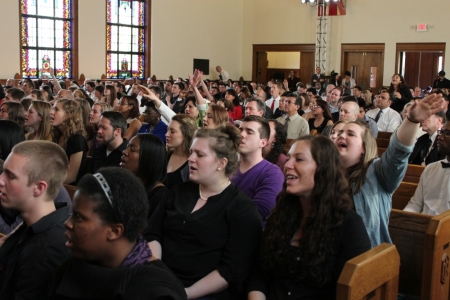Most Christians in America Now Support Homosexuality?

A comprehensive study released by the Pew Research Center analyzing various questions surrounding Americans' relationship with religion has found that adults continue to overwhelmingly believe in God, but that support is declining.
The poll also found that a majority American Christians now support homosexuality, but less so on abortion.
Statistics from the 2014 Religious Landscape Study, which polled 35,000 American adults, found that 89 percent of the overall U.S. adult population believes in God, which is down from the 92 percent mark in 2007.
Other aspects of religious life were also documented — 55 percent of adults said they pray daily; 53 percent said they find religion very important; and 50 percent said they attend services at least monthly, with all numbers being down from the 2007 statistics.
The number of adults who are religiously unaffiliated rose from 16 percent to 23 percent, though that category comprises a broad number of views. Sixty-one percent of the unaffiliated said they believe in God, but only 9 percent attend services at least monthly.
On the other hand, those who described themselves as religiously affiliated continued to show strong religious practices, with 97 percent expressing faith in God, and 62 percent attending religious services at least monthly.
Several national surveys in the past couple of years have all shown that the number of religiously unaffiliated adults in America is on the rise. A 2014 General Social Survey conducted by NORC and the University of Chicago, which released its study back in March, said that 21 percent of Americans have no religion.
The 2014 Religious Landscape Study, conducted between June 4–Sept. 30 and having a margin of error of less than 1 percentage point, found that American Christians' attitudes on social issues, such as homosexuality, have also been changing.
Over 50 percent of Roman Catholics, Mainline Protestants, Orthodox Christians, and black Protestants all separately said that homosexuality should be accepted by society, but only 36 percent of Evangelical Protestants, 36 percent of Mormons, and 16 percent of Jehovah's Witnesses agreed.
In total, 54 percent of all Christians agreed with homosexuality being accepted by society, which is up by 10 points from 2007.
"Changing attitudes about homosexuality are linked to the same generational forces helping to reshape religious identity and practice in the United States, with millennials expressing far more acceptance of homosexuality than older adults do," the report stated.
"Fully half of millennials who identify as Evangelical Protestants, for instance, now say homosexuality should be accepted by society."
Most Christian denominations remained opposed to abortion, however, with Evangelicals and Mormons being the most opposed.
There were notable divisions among party lines as well. While as much as 82 percent of Republicans said that they are Christians in 2014, only 63 percent of Democrats said the same. On the other hand, while 14 percent of Republicans were religiously unaffiliated, Democrats doubled that number at 28 percent.
Democrats also had more adults who specifically identified as atheists — 5 percent for Democrats, compared to only 1 percent for Republicans.





















